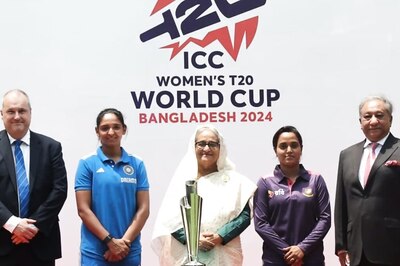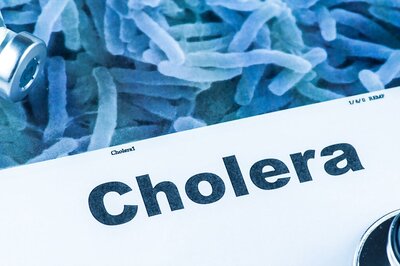
views
An interesting exercise in the wired era is to type two words into Google search - 'Turkish' and 'model'. As one quickly sees, the world's commentariat has found common cause in proposing Turkey as the elixir for strife in just about every place between East Europe's Carpathian Mountains and the Hindu Kush.
If only places like Bosnia, Egypt and Afghanistan could just be more like Turkey, the arguments go; implicitly the lament is that, if only they could have rulers like Turkey's Justice and Development Party, known by its Turkish acronym AKP.
Often considered one and the same in the international mind, the powerful AKP and its charismatic leader, Prime Minister Recep Tayyip Erdog (an, were set to become even more so after the election here which brought the party back to its biggest victory yet. When the final tally was in, the AKP had 50 per cent of the votes, up three points from four years ago. The early calculation was that this would give the party 326 seats in the 550 seat Parliament. The calculus over the immediate issue, the rewrite of a 1982, junta-drafted (military-led) Constitution, suggests the party is just shy of the ability to do that on its own. So while some bridge rebuilding with the opposition may be on the cards, there was little evidence of a mood for that in the first comments. Erdog(an declared himself the winner of the people's mandate, the "first party in Turkish history to increase its mandate in three consecutive elections".
The main opposition Republican People's Party, or CHP, got a 26 per cent share while 13 per cent of the votes went to the Nationalist Movement Party. Those two, along with the Kurdish Peace and Democracy Party, or BDP, which received just under 7 per cent, will now form a fractious opposition.
To date, the ubiquitous 'model' narrative has served as the prima facie evidence that Muslims can be democrats. Exhibit A is Erdog(an's Islamic-rooted AKP which burst onto the national scene in 2002 to form Turkey's first one-party government in a generation. Since then, Erdog(an has moved to take credit for many things — even the 'Arab Spring'. Many a Europarliamentarian and Washington desk officer has been keen to support that thesis as his poster became a fixture in marches from Tunisia to Gaza to Cairo's Tahrir Square. That's one model.
In other examinations of Turkey, perhaps a throwback to a time when democracies did not come with qualifying adjectives, the 'model' is the sum of its secular parts, the feat of feet in so many camps: A half century in NATO, expanding ties throughout the Middle East and Central Asia and a bid for membership in the European Union. Again the AKP tops this balancing act.
When the model is the economy, few can fault the same party's performance over the past decade that has trebled the GDP, created a new class of industrialists and entrepreneurs at home while turning heads abroad over an explosion in foreign direct investment. FDI peaked in 2007 at $23 billion, more than all inbound investment to the country up to 2000.
The more than 100 Indian ventures include a $4.9 billion deal between the Indian Oil Corporation and Çalik Energy. A decade ago, few knew of Çalik, now one of Turkey's largest conglomerates. Few see it as coincidence that the CEO, Berat Albayrak, is Erdog. This would be the model as a closed club.
But the much-discussed 'Turkish model' will now be undergoing an overhaul. The three opposition parties have deep divisions among themselves. But all tend toward a secular world view that has reinforced the AKP's religiosity as a major faultline in Turkish politics. That dynamic of polarisation is easy enough to predict, say analysts. In this round of AKP rule, the hardcore secularists will warn about school textbooks and the slow disappearance of alcohol from the public sphere. The alienated liberals will lament the lack of progress on human rights, including those of women. And the Kurds will hold out for what the AKP promised but has not delivered. Erdog(an will then do as he pleases, in all likelihood with greater ease. He has made it clear that his top priority is a new constitution with a French- or Russian-style presidential system. He has also made it clear that he intends to take that all-powerful job, no later than 2015.
This election has all but ignored stalled EU talks, the frozen division of Cyprus, the ill-fated effort to restore diplomatic relations with Armenia or the prospect of thaw in the deep chill with Israel. Some commentators have called for action on those fronts.
Turkey's embrace of its eastern neighbours, harsh quarrels with Israel and moral support to Iran's government in its nuclear research standoff with America have played well domestically, leading many to question whether Turkey will turn its back to the West. But that storyline does not play here. For as Nigar Göksel, editor of Turkish Policy Quarterly, and others are quick to point out, Turkey's policy capital in Brussels and Washington is its ties to Muslim states. Conversely, Turkey's EU relationship may look troubled in Istanbul, but in Dubai or Doha, it is precisely that tie and the existing EU customs union enabling growing Turkish exports to the West that make it an appealing place to invest.
Turkey's high-profile Foreign Minister Ahmet Davutog(lu is expected to return to that post and a streamlining of ministries announced days before the election included word that the existing directorate for EU affair will be upgraded to a full 'Ministry for the European Union'.
Turkey is demanding a greater say in NATO in exchange for its 6,000 non-combat troops in Afghanistan and despite early wavering on NATO's Libya operation, Turkey quickly shifted after the operation began. In early June, Turkey and NATO agreed on upgrading a Turkish base in the Aegean city of Izmir as the logistics centre to support the 'Arab Spring'. In June, Davutog(lu met with US Secretary of State Hillary Clinton in Abu Dhabi, pledging $100 million in recovery aid to Libya.
"Turkey has a lot of bridges to rebuild with the West, that's for sure," said Göksel. "But with the election behind, Turkey also now has the chance, which it will try to seize, to not walk away but walk taller in her relationship with the West." And walking tall in global terms is clearly the message that Erdog(an has carried on the campaign trail, generating huge rallies to hear his vision of an array of India-style megaprojects.
Erdog(an wants to build a host of new ultra-modern cities, add a third suspension bridge above Istanbul's Bosphorus waterway and a car tunnel beneath it. He also wants a new Bosphorus, an 'Istanbul Canal' for shipping to be dug 100 kilometers west of the current strait made by Mother Nature. An allied business group has already built Europe's tallest business tower in Istanbul and Erdog(an wants to see more. In the coming term he plans to complete a move of the Central Bank from the capital to Istanbul, making it the core of a 'global financial' centre to rival Frankfurt or London.
"We will be one of the top ten economies of the world by 2023, he frequently tells audiences, a reference to Turkey's looming centennial as a republic. The first installments of this long-term vision have not come cheaply, points out Emre Deliveli, a Harvard-trained economist. The long list of projects will stretch resources even more tightly and ordering off such long menus may prove embarrasing when the bill comes.
Privatisation efforts, a major source of the government's development budget, have run their course, with fewer big ticket items like auctionable refineries, phone networks or state cement plants to keep new-style public works coming. The 12-month current account deficit stood at $60 billion in March, roughly 8 per cent of GDP. Inflation, once tamed, nearly doubled in March to 7.2 per cent. And while unemployment of 11.5 per cent is down from the 2009 high of 16.1 per cent, it is generally at 20 per cent among the young. With FDI all but dried up and the deficit now being financed with portfolio flows, the economy is fragile, up against multiple break points.
Erdog(an's model for Turkey assumes continued high growth of 6 per cent to 8 per cent and that is a hard case to make for the long term, Deliveli said. Moody's (Credit rating company) and Standard and Poor's (Financial Services company) have both resisted calls for a ratings upgrade with warnings of the current account deficit veering out of control. And last month, Turkey's Finance Minister Ali Babacan drew heat in banking circles for his rare exercise of the right to halt publishing of an International Monetary Fund report on Turkey's economy. Reportedly, the IMF's view will likely scare investors, which Turkey cannot afford.
"Turkey desperately needs a contractionary fiscal policy, the spigots of private credit need to be tightened and the government needs the room to make unpopular decisions if we are not to crash," Deliveli said.
If the AKP proceeds to a new referendum, that will in turn lead to more spendthrift politicking and dangerous populist spending. That, after all, is the model to date. But in virtually every crash in Turkey's last half century of boom-and-bust economy, the current account has always been the trigger and now it is at its highest deficit in history.
"The last 10 years have produced lots of golden eggs, but now we have to avoid killing the goose that laid them," Deliveli said. "Erdog(an surely has his own model for the future. But it may not mesh well with the business and financial models of those who today are really keeping Turkey afloat."
(David Judson is a senior journalist based in Istanbul)
















Comments
0 comment